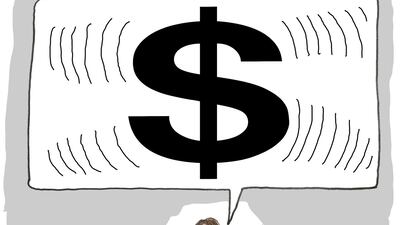Have you ever heard of the term cognitive dread? It’s a phenomenon that affects people dealing with uncertainty. It can fuel anxiety, and with it, all sorts of issues such as not sleeping, grinding your teeth, being ratty, depressed, unable to cope. It can drive you mad.
Living with financial uncertainty has this effect on you. And Money Anxiety Disorder (Mad) is another concept that can cause these types of symptoms.
Imagine this: you go to bed each evening, not knowing if you’re going to be paid or have access to cash by the end of the next day, week or month. You also don't know whether you have the cash flow to pay for your outgoings. The knock-on effect of not being able to meet your commitments could scar you for life, with credit scores being affected or mortgages going unpaid.
And sometimes it’s not about you being "bad" at something, like planning your finances or life. Sometimes it’s about many "bad" things happening close together, that wipe you out.
How about this for a real-life situation: there is a single mum, whose former husband commits fraud against her and takes her life’s savings. She leaves the UAE partly to deal with threats from him that he will take their children. This means she has the additional challenge of finding money to set up home again and funding her new life with a new way of earning. After all, life needs paying for — every day.
Her former husband continues to wreak financial havoc on her and her family’s life because he then absconds from the UAE, whereupon cheques issued to her in lieu of the fraud are no longer bankable. These are cheques she had factored in to her financial plan to provide cash she needs to live with dignity. She assumed the cheques would be honoured, but they won't be because her former spouse has cleared out his account and left the country.
Can you imagine how it feels to be in this situation? Anxious, with a feeling of dread? This is reasonable in view of the circumstances.
This person did the right things: saved money, that was taken; planned for a future that was then scuppered and relied on the legal system to guide her. But her former husband surprised her with the unthinkable, by leaving her high and dry. Twice.
Would you class her reality as having to deal with risk – or uncertainty? They are very different, and it’s important to understand why.
In finance, uncertainty has a very different meaning than risk. American economist Frank Knight made the distinction in 1921, when he differentiated risk — which can be measured and protected against — from uncertainty, which cannot.
To use a more recent example, uncertainty means what the former US defence secretary Donald Rumsfeld famously called “unknown unknowns”.
It’s the stuff you can’t possibly mitigate against — because you have no idea these things exist, or how global, local, personal or public events can possibly unfold. It’s the stuff of calamity and intense, immense stress.
When you are confronted with financial uncertainty — not knowing when, if or how much cash you’ll have access to — you cannot plan, prepare, protect or predict.
Money equals food, shelter and future in our modern, Western-leaning culture. In the American psychologist Abraham Maslow's famous hierarchy of needs, money represents the first, widest layer of the pyramid. So it's normal that fear of not having enough money, for now or later, is a major source of stress. No wonder people suffer from Money Anxiety Disorder.
So how can you deal with financial uncertainty? Well, you can’t predict what could possibly happen in life — and so we’re told to plan for life’s uncertainties by:
• Maintaining an emergency reserve fund
• Investing for your goals, time horizon and risk tolerance.
But how would you feel if I added: do not trust your spouse or anyone with your cash or information about your accounts. Anyone.
Research out this week on how stress affects our hair pigment simplifies the effect stress has on our bodies. Scientists at Harvard University found that stress causes nerves involved in the fight-or-flight response to pump out a hormone which wipes out the stem cells used to make hair pigments. In other words, they have shown how stress can, over time, speed up the greying process.
Now consider what other damage the fight-or-flight response does to the rest of your cells, and your cognitive faculties.
Financial uncertainty — it’s the sort of thing you wouldn’t wish on your worst enemy.
Nima Abu Wardeh is a broadcast journalist, columnist, blogger and founder of S.H.E. Strategy. Share her journey on finding-nima.com

